BY Martha Cecilia Ovadia
TFN Senior Program Associate for Equity Programs and Communications
Who are the people that make up The Funders Network? Know Your Network is an occasional Q&A series lifting up voices from across the network. In this post, we’re featuring a Q&A between Don Hickman of the Minnesota-based Initiative Foundation and Martha Cecilia Ovadia of TFN. Don is also a member of TFN’s Board of Directors and TFN’s Philanthropic Preparedness, Resiliency and Emergency Partnership, a learning cohort created to provide resources for community foundations to build their skills and leadership capacity in order to be better informed and prepared should a natural disaster strike their communities. (Responses have been edited for length and clarity.)
Q. I know you are currently the vice president for Community and Workforce Development for the Initiative Foundation in Little Falls, Minn., in addition to serving as a TFN board member. But we hear you were a scientist and community activist before joining the philanthropic sector. What was that like?
The first 20 years of my career was spent as an environmental scientist. I loved the field, which included time as a trail guide in Rocky Mountain National Park, surveying water quality in the Black Canyon of the Gunnison, organizing rural low-income communities in New England to protect water quality, working as a scientist and lobbyist for the Massachusetts Audubon Society, and studying the endangered Humpback Chub in the Grand Canyon.
Q. What brought you to philanthropy? Is there anything specific that has surprised you about working in the sector?
I had moved to Minnesota to marry my wife in the mid-1990s, and felt unfulfilled working as an environmental consultant. I started volunteering with local nonprofits, and the Blandin Foundation hired me as a field contractor. After about a year with Blandin, the Initiative Foundation hired me as their environmental program officer, and I’ve remained there so long that I’ve added a varied array of other foci, from improving access to quality, affordable childcare to helping launch a program for Somali immigrants to start their own businesses in Central Minnesota. Right now, my top priority is to help prepare for the economic impact of the closure of the largest coal power plant in the Midwest, which represents nearly 75 percent of the local tax base. Every day I am surprised and humbled at how hard people will work to improve their communities and help their neighbors when they’re offered the most modest of encouragement and occasional funding.
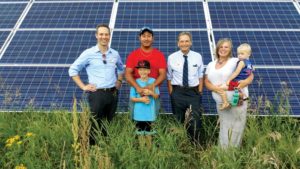
Q. You are very involved in our PPREP learning cohort. What is one thing you have learned working with PPREP that you think has been helpful or illuminating during the ongoing coronavirus pandemic?
The TFN team and peer foundations have really opened my eyes to how unequal access to resources and tools of resiliency are. The outcomes and recovery for a middle-class homeowner with insurance are so profoundly different than those available to the renter with no bank account or health care. Heaven forbid that their language or culture is different than the dominant culture. We know that compounds the inequities and presents even more barriers to equitable relief and recovery.
Q. In your role at the Initiative Foundation, you work with a lot of immigrant and refugee communities. What is one thing you wish folks knew about the people you are working with? And what is the hardest part of doing this work?
This element of our work is perhaps my greatest, and most unexpected joy. Central Minnesota (and especially the community of St. Cloud) is a major hub for refugees and immigrants; people who’ve fled very difficult situations in hopes of improving the lives of their families. If everyone had the work ethic and commitment to their families as the individuals I routinely engage with, I would have confidence that this country could overcome any challenge or obstacle. Unavoidably, I also see acts of hatred and prejudice, and it breaks my heart to think how quickly most of us have forgotten the immigrant experience of our ancestors.
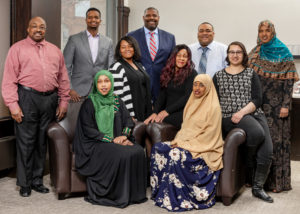
Q. In the past few weeks, we’ve witnessed the murder of George Floyd at the hands of police in Minneapolis — less than two hours from your home in Little Falls — which has prompted protests across the globe and a national reckoning on race. As someone who works closely with local non-profits in the region, how is this impacting the communities with whom you work? What do you see as philanthropy’s role in meeting this historic moment?
This is pretty painful. In Minnesota we liked to believe that we’re a more inclusive and progressive state. Four years ago, when Philando Castile was killed we told ourselves that a terrible thing had happened, but that now we’d changed the culture and it would never happen again. With the recent death of George Floyd none of us can deny that the percentage of bad outcomes of law enforcement encounters are horrific for people of color, including in our own state. For two weeks I was pretty deeply depressed, until I had an encounter with a TFN colleague from the Surdna Foundation, who told me that she believes that change can happen; that we’re in a time of awakening. In the weeks after that I’ve participated in conversations on equity on a daily basis, with people which whom the issue had never been raised before. If change were easy it would have been done long ago, and confronting systemic racism will never be easy. But I am prepared to believe that more and more people are ready to listen to others, work for change, and create a more just community. The arc of history…
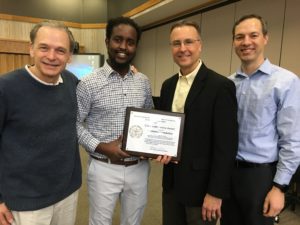
Q. With so many of us sheltering in place, and knowing you must have traveled quite a bit for work before we all hunkered down, can we live vicariously through you for a minute and ask what your favorite site visit or work trip has been so far?
That’s like asking someone to identify their favorite child! One of the joys of participating with TFN has been the varied “learning from place” experiences associated with PPREP, the River Partnership of Community Foundations, which ended a few years ago, or TFN’s conferences. I think the most memorable trip might have been to the Mississippi Delta, including stops of historical significance to the Civil Rights Movement and in musical history.
If I could host visitors to my region right now, I would take you to the Mosque and Islamic Center of St. Cloud, have the Somali entrepreneurs cater our lunch, ask friends at the Leech Lake Reservation to demonstrate how the Ojibwe people harvest wild rice, and meet some of the citizen-scientists working to prevent the spread of aquatic invasive species in our land of 10,000 lakes.
Q. We always like to ask about home. As a local in Little Falls, what is your perfect day in Little Falls? Where would you have lunch? What’s that secret place you wish everyone knew about?
The Mississippi River literally flows outside the door of the Initiative Foundation; on a spring day you can walk below the dam (once used to power paper mills) and feel its cold spray. The Charles Lindbergh childhood home is across the river, and Chief Hole in the Day (a key Ojibwe leader) is buried just upriver. Zebulon Pike reached this area in 1805 as part of an early expedition through what the Americans called the new Louisiana Territory. The downtown area is a classic small Midwestern town, with lovely restored storefronts. If you look closely at the granite edifice of the American Bank you can see that the name is not off-center, but until WWI was the “German-American Bank.” One can guess that the offending ethnicity was sandblasted away about this time.
The Black and White Deli is the favorite downtown lunch spot for many visitors, but I am equally fond of Little Fiesta and Sanchez Burrito, both owned and operated by Latinx families that now call Little Falls home.
North of town is the Camp Ripley National Guard Training facility, where volunteers from throughout the country come to practice artillery drills and night maneuvers. Interestingly, the land encompassed by the camp also includes the longest stretch of undammed Mississippi River in Minnesota, and is also home to a pack of around 40 timber wolves, and an equally robust number of black bears. Several winters ago, my wife spent her sabbatical radio-collaring and tracking both.
Life-long residents of the area likely would confess to a secret fishing hole (the region’s true religion), but I most treasure riding my bike on country roads, over hills and around the lakes, ideally on an autumn day when the leaves are ablaze, but the air is cool and the sunshine warm.
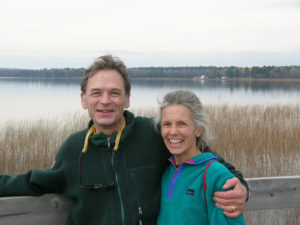
Q. We ask this of all of our Know Your Network contributors: What is something you do as a practice of self-care, especially in 2020 when this work is so stressful and requires us to really rise to the occasion?
I confess, the “stay at home” has been very gentle on me. I’m NOT spending two hours a day in my car, and can instead work longer while still having more time to jump on that bicycle or swim in my lake (once the water warms up). I also can’t help but reflect every day on the privileges of my position; both adults in the home are employed, our home is paid for, we could access health care if we needed it, our refrigerator is full, and our youngest child is able to continue her college classes from home on our sometimes spotty WiFi. So many of the residents of my region couldn’t list a single one of these blessings for themselves, so whenever I feel tired or frustrated by the challenges of choosing who does and doesn’t receive funding. I remind myself of all that I have to be grateful for, and hope I can bring hope to others.
______
About the Author
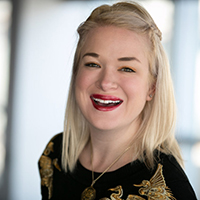
Martha Cecilia Ovadia is TFN’s Senior Program Associate for Equity Programs and Communications.
Featured photo at top: Aerial view of Little Falls, Minn. Photo credit: Little Falls Chamber of Commerce

Very nice article !